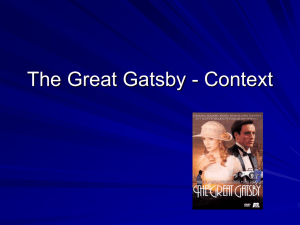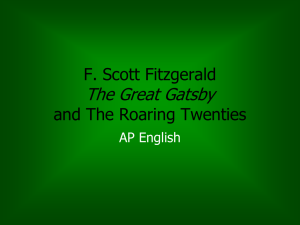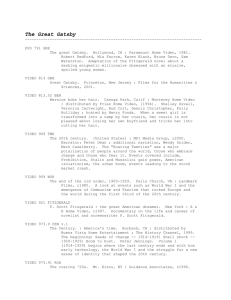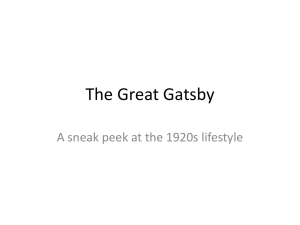gatsby_roaring_twenties pp
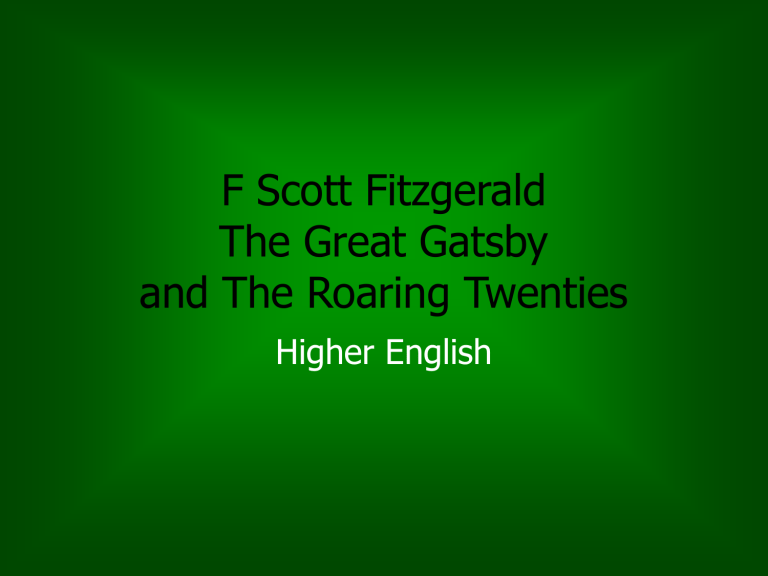
F Scott Fitzgerald
The Great Gatsby and The Roaring Twenties
Higher English
1920-1929: Changing Times
The 1920’s were a time of unprecedented social and technological change in so many areas:
Literature Music
Media / Technology Women’s Rights
Prohibition Lifestyles
An economy stimulated by WW1 fueled a massive economic boom.
General Business Conditions
• Stable prices
• High employment
• Number of firms increased annually until
1929
• Steady failure rate
• Prime interest rate averaged less than 5%
• Stock yield higher than bond yields
Income Distribution
• Equalizing effect of income tax during the war but
• 1922: Top 1% held 32% of nation’s wealth
• 1929: Top 1% held 38% of nation’s wealth
• “The rich get rich and the poor get… children”
The Roaring Twenties
The decade of the twenties is often referred to as the
“ Jazz Age’. However, the term has much as much to do with the jazzy atmosphere of the time as with the music!
Jazzy Sounds
• Prohibition brought many jazz musicians north from
New Orleans to Chicago and
New York
• Joe “King” Oliver” was one of the best
• Jazz became the soundtrack of rebellion for a younger generation
Jazzy Duds
• Flappers were typical young girls of the twenties, usually with bobbed hair, short skirts, rolled stockings, and powdered knees!
• They danced the night away doing the
Charleston and the
Black Bottom.
Jazzy Talk -Twenties Slang
Gee I wish a torpedo would bump off this flat tire • All Wet - wrong
• Bee’s Knees - a superb person
• Big Cheese -an important person
• Bump Off - to murder
• Dumb Dora - a stupid girl
• Flat Tire - a dull, boring person
• Gam - a girls leg
• Hooch - bootleg liquor
• Hoofer - chorus girl
• Torpedo - a hired gunman
Dumb
Dora
Music in Gatsby
• Remember the
“yellow cocktail music” of Gatsby’s parties?
• This was Jazz and
Ragtime
– Louis Armstrong,
– Duke Ellington
King Oliver
Symphonic Jazz and Gatsby
• George Gershwin wrote both classical and popular music
• He was the first composer to combine jazz and classical music with Rhapsody in
Blue in1924
• Was this Vladimir Tostoff’s
“Jazz History of the World”?
Lifestyles and fashions of the
1920s
• No more Victorian Values
• Flappers
• Collegiate Students
• Independent women
• Gaiety
• Increasing wealth
• Social mobility
• Alcohol consumption
Women’s Rights Movement
• Suffrage - the right to vote
• Nineteenth
Amendment (1920)
• Changing attitudes and fashions help bring about the new woman e.g. Jordan
Baker
The playful flapper here we see,
The fairest of the fair.
She’s not what Grandma used to be,--
You might say, au contraire.
The Flapper by Dorothy Parker
Her girlish ways may make a stir,
Her manners cause a scene
But there is no more harm in her
Than in a submarine.
She nightly knocks for many a goal
The usual dancing men.
Her speed is great, but her control
Is something else again
All spotlights focus on her pranks.
All tongues her prowess herald
For which she well may render thanks
To God and Scott Fitzgerald.
Her golden rule is plain enough--
Just get them young and treat them rough
Prohibition
• The Volstead Act
• 18th Amendment
(1919)
• Bootleggers
– Sold, bought, consumed alcohol.
– Gangsters
Al Capone and a ‘gonnection’
Media and Technology
• Automobilisation
– the car is available to many
• from courting to dating
• Mass Media
– Magazines and literacy
• Reader’s Digest
• Time
– Radios and advertising
– New forms of narrative
• Movie - “talkies” e.g. The
Jazz Singer
• Popular Sports
F Scott Fitzgerald
• Descendent from “prominent” American stock
• Attended Princeton but left without graduating
• Missed WWI (just)
• Met Zelda but couldn’t afford to marry her
• Published This Side of Paradise in 1920 at the age of
24: instant stardom
• Married Zelda, his “golden girl”
• Wrote “money-making” popular fiction for most of his life, mainly for the New York Post: $4000 a story
(which equates to about $50,000 today)
• He and Zelda were associated with high living of the
Jazz Age
Fitzgerald Continued
• A daughter, Scotty
• Wrote what is considered his masterpiece, The Great
Gatsby, in Europe in 1924-25
• Zelda has an affair and Gatsby poorly received
• Attempts to earn a clean literary reputation were disrupted by his reputation as a drunk
• Zelda becomes mentally unstable
• Moved to Hollywood as a screen writer
• Dies almost forgotten aged 45
• Zelda perished in a mental hospital fire in 1948
• Only became a “literary great” in the 1960’s
Literature of the 1920s
• Authors wrote about their personal lives as something “knowable”.
• Gatsby contains a great deal of autobiographical material and references to the 1920’s.
• Fitzgerald was also influenced by Modernist theories about art.
Modernism in the Twenties
The Modernist Era
• Rejection of Romanticism and the advent of moral uncertainty
– the catastrophe of World War I
– (the wasteland and valley of ashes)
• Embracing the new i.e. mechanization and industrialisation
– (Gatsby’s car)
– new (replaceable) fashions
– mass entertainment
• Using new means of Representation
– the development of cinema,
– the mass media and advertising
Modernism and Nick Carraway
• Because of the chaos there was a longing for order.
• The modernist generation produced utopian ideologies such as communism, fascism, and futurism.
• Look at Nick in his retreat from the modern word.
• “I wanted the world to be in uniform and to stand to a sort of moral attention forever”
Modernism and Romanticism
Nick Gatsby
Fitzgerald and Modernism
• Modernists mistrusted the possibility of absolute truth and idealism.
• Consider the multiple and limited points-of-view employed in Gatsby. What effect does this have on the concept of absolute truth?
• How does Nick force us to view the “reality” that he portrays?
• In modernist literature “loose ends” were embraced rather resolved clearly. What does this suggest about the truth?
• Does Fitzgerald do this with The Great Gatsby?
Is The Great Gatsby a period piece, or does the novel step outside its time and address universal themes?

